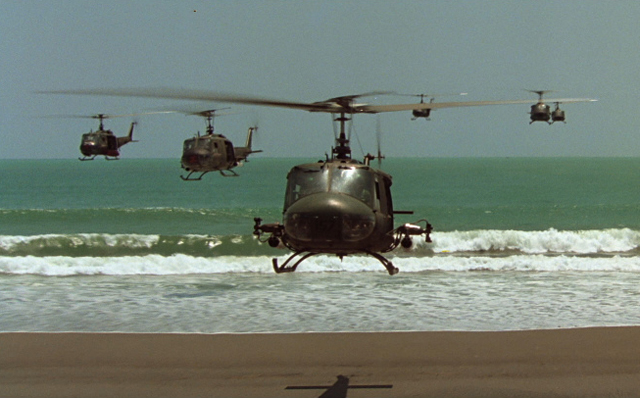
When Hollywood looks to adapt a popular book or series of books into a film, they often do so in three separate ways; they either translate it directly from page to screen, or they keep the story but change parts to make it more cinematic, or they just disregard the book entirely and use the title and premise only. Most adaptations stay pretty faithful to the original source, but you’ll find quite a few that fall into the middle category. And this is merely due to the fact that there are some books that are just un-filmable as they are on the page. What works in prose doesn’t always work on screen, so it takes a few inspired filmmakers out there to figure out how to make the translations work in the visual medium. Some of the most interesting examples of adaptations that take liberties with their source materials are the ones that transplant the characters and setting of the original story into a different time and place altogether, and still maintain the essence of the original story. Writer and Director Amy Heckerling managed to successfully transplant the classy high society of Victorian England from the novel Emma into the modern excess of Beverly Hills in the movie Clueless (1995). West Side Story took Shakespeare’s Romeo & Juliet and brought it into streets of New York City. But perhaps the most striking re-appropriation of a classic novel into a new setting was the adaptation of Joseph Conrad’s 1899 novella Heart of Darkness into the Vietnam War epic Apocalypse Now (1979), directed by Francis Ford Coppola.
Heart of Darkness is one of the most highly influential novels of the early 20th century, becoming one of the earliest examples of modernist literature. Joseph Conrad’s book is a relatively short read (just a little under 100 pages), but it is heavy in theme and introspection. The story is told from the point of view of Captain Marlow, as he recounts his experiences sailing up the Congo River into the heart of the African continent in search of a renegade Ivory trader named Kurtz. As Marlow heads deeper into the jungle, he encounters more and more strange sights and perilous dangers, and all the while he learns more and more second hand accounts of this man Kurtz who has become something of a demigod to the natives out there in the wilderness. When he finally finds Kurtz, the mythical man is deathly ill and a shell of his former self. Marlow no longer fears the man, but instead pities him and seeks to bring him back to civilization. Kurtz however dies before the journey can begin, his final words being, “The Horror. The Horror.” Marlow doesn’t know what he means until he begins to go through Kurtz’s papers and uncovers the true insanity that the isolation in the jungle brought to him. Heart of Darkness works as both a fascinating psychological character study as well as a commentary on colonialism. The story is so much more than a journey into the wild frontier; it’s also a study of man’s effect on the world, the limits to which one is pushed to in extreme circumstances, as well as the disconnect between how things are viewed by the civilized and the uncivilized. The complexity of it’s themes and the vividness of it’s imagery has inspired many artists since, such as poets like T.S. Eliot, who quoted Heart of Darkness in his poem “The Hollow Men.” And of course, filmmakers found inspiration in Conrad’s writing as well, though in less direct ways.
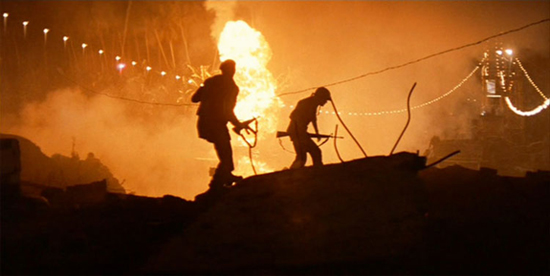
“Who’s in charge here?” “Ain’t you?”
You can see some of the ingredients of Conrad’s Heart of Darkness in the films of John Huston’s The African Queen (1951), Henri-Georges Clouzot’s The Wages of Fear (1953), and even to some extant in Steven Spielberg’s Jurassic Park (1993). But, a fully faithful adaptation by Hollywood had always been elusive. Many filmmakers tried, including Orson Welles, but nobody could ever make it work out. It’s perhaps because of the bleakness of Conrad’s novel, which wouldn’t work so well in an industry that demands happy resolutions to their stories. It wasn’t until a young film student from USC named John Milius took up the challenge of adapting Heart of Darkness. According to the making of documentary on the Apocalypse Now home video release, Milius was inspired to tackle the story after his professor proclaimed that the book was un-filmable, stating, ” If Welles couldn’t do it, than nobody can.” Fortunately for Milius, there was a real world event going on that echoed the themes and visuals of Conrad’s novel and that was the Vietnam War. Milius saw the mayhem and carnage of that conflict broadcast nearly daily on the news and the political upheaval that resulted from it and found that moral ambiquity of Conrad’s story had the same resonance with what was happening in Vietnam. So, even before graduating from college, Milius began the first draft of what would become Apocalypse Now. He initially wanted his fellow USC classmate George Lucas to direct, but eventually the script found it’s way to Francis Ford Coppola, who helped Milius with the final drafting of the script. The conflict ended before cameras started rolling, but the experience was still fresh in people’s minds, and as we would soon learn, Conrad’s Heart of Darkness would become more relevant to the modern world than anyone would’ve imagined.
It should be noted that Apocalypse Now is not a direct translation of the novel to the screen, apart from the obvious change in setting. Milius and Coppola’s adaptation actually doesn’t start to resemble Conrad’s novel until the very final act. For the first 2/3 of the movie, the movie is more of a series of vignettes of wartime experiences that believably would’ve happened during the Vietnam conflict, and in some cases were directly inspired by real accounts. Neither Coppola nor Milius served in Vietnam (Coppola due to his conscientious objection and Milius due to his health), but they determined to create a sense of what the actual war must of been like to the soldiers who fought it. And the reality was that with such a divisive, unclear reason as to why American soldiers were fighting in the war in the first place, being shipped out to Vietnam really did in fact feel like a journey into the “Heart of Darkness.” The experience took a psychological toll on those who served, seeing the futility of their missions and oftentimes inhumane acts they would have to perform, all for something that few ever believed in. The book Heart of Darkness dealt with some of the same themes, but did so with a critical eye towards the dehumanizing policies of colonization in uncivilized parts of the world such as Africa. Like Marlow’s brushes with the wilds of Africa, the journey for the soldiers in Apocalypse Now is no less a surreal clash between the known and unknown worlds, and the dehumanizing effects of that conflict. Overall, the themes remain in tact throughout the film’s adaptation and the use of Vietnam as the setting couldn’t have been more perfect for the translation.
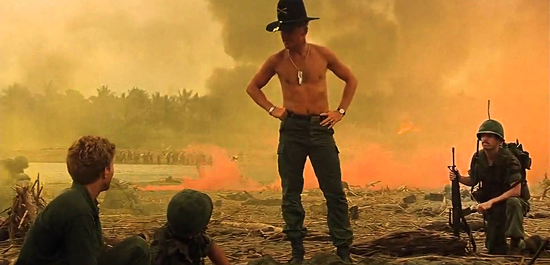
“I love the smell of Napalm in the morning.”
One of the criticisms that has followed the novel over the years is the viewed racist tone of Conrad’s depiction of the African natives. The natives are largely depersonalized savages in Conrad’s novel, and many critics have argued that this is representative of a colonialist’s view of different cultures, where because they are not civilized in the European fashion must mean that they are less than human. While I do agree that Conrad’s depiction of the African natives is racially insensitive, at the same the novel points to their exploitation as the greater evil. The book is strongly anti-colonial in it’s message, with Marlow making the argument whether it was the exposure to the the wilds of Africa that drove Kurtz mad, or was it the pressure of the colonial system being forced into a place it didn’t belong responsible for making the change in him. Which asks the question, where is the true “Heart of Darkness;” in the civilized or uncivilized world. Coppola and Milius wisely try their best not to dehumanize the Vietnamese people in their story by not shying away from the human toll that the conflict had on them. The Sampan massacre scene in particular shows the brutality that the War brought upon those left helpless in the crossfire. Another way that the movie addresses the racial undertones of the story is through the side-plot involving Colonel Kilgore (played brilliantly by Robert Duvall). The character was entirely crafted for the film and perfectly represents the encroaching imperialism of military might in a land unable to fight against it. Kilgore represents pure, disaffected exploitative greed in the form of someone who has the power to take what he wants, just because he can. The entire ivory trade that Marlow interacts with in the books represents this too, but here in the movie, we see the system personified in someone maniacal enough to invade a village just because it has the best surfing beaches in the vicinity. It’s a departure that really serves the film adaptation well in the end.
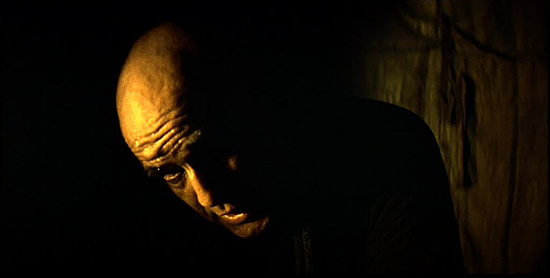
“You’re neither. You’re an errand boy, sent by grocery clerks, to collect the bill.”
Coppola and Milius departed from the book to help reinforce the anti-colonization subtext of the novel, but what they faithfully translated directly from the book was also brilliantly handled. The ultimate destination of Kurtz’s compound is practically lifted off of the page, and the enigmatic Kurtz is also faithfully brought to life, thanks in no small part to Marlon Brando’s iconic performance. This wasn’t without issue, however. Coppola had to deal with Brando arriving on set overweight and having not memorized any of his lines. He hadn’t even read the novel itself, to which Coppola had to read it aloud to him before they started filming, in order for him to have context for the character. Even still, Brando’s eccentricity translates perfectly into the character of Colonel Kurtz. Like the Kurtz of Heart of Darkness, he is a man both feared and worshiped by those around him, and the journey to see him is like a journey delving into the madness that has made him what he is. This is also represented perfectly in the film through the narration, provided by Martin Sheen in the role of Captain Willard (the film’s stand-in for Captain Marlow). Like in the book, we dissect the conditions that created Kurtz through Willard’s own journey deeper into the jungle and see the continuing, un-explainable horrors that would’ve driven him mad. As Willard arrives at the compound, he sees that Kurtz’s philosophies have turned all who come to him into his disciples, including a photojournalist who worships him like a God (played in a zany performance by Dennis Hopper). In this, Willard doesn’t just see the manifestation of evil in his encounter with Colonel Kurtz, but also a scary reminder of the kind of dark figure he might become if he falls too deep into this world. That in essence is what Joseph Conrad’s book was meant to explore, which is the internal conflict of man’s struggle with his own baser instincts. But, the question he posed in the book was whether it was the wilderness that brought it out of Kurtz or did it just naturally come through on it’s own.
The dichotomy between Kurtz and Marlow in the book translates quite well into the film, but is actually dealt with in a different way. In many ways, the philosophies of both men are complete opposites and yet they find themselves agreeing on most things. Kurtz is of a hard-line, militaristic mind while Marlow is of a more civilized, pacifist one. It seems only natural that these two character types would translate so well into a wartime setting. In the movie, Willard seems to admire Kurtz for his bucking of the system that he recognizes is broken and getting worse, and yet he can’t bring himself to join his crusade knowing the atrocities that Kurtz and his militia have committed. In the movie, he states, “Part of me was afraid of what I would find and what I would do when I got there. I knew the risks, or imagined I knew. But, the thing I felt the most, much stronger than fear, was the desire to confront him.” There is an understanding between both Kurtz and Willard about what the War has turned them into, and that neither is ever going to change the other’s mind. It should be noted that a difference in the translation was that in the novel, Marlow is sent to save Kurtz, but in the movie, Willard is charged with killing him. Kurtz’s fate is the same in both movies, but the conditions of his death changes the outcome somewhat. In the novel, you get the sense that Marlow’s encounter with Kurtz will lead him down a different outlook on the whole practice of colonization, with maybe an eye towards fighting against the system in response. The movie is a little more ambiguous. Willard savagely murders Kurtz and leaves the compound and all of Kurtz’s followers behind. We don’t know what happens to him after he’s completed his mission. Is he changed for good or bad? Will he become another Kurtz himself? It’s a morally ambiguous finale that perfectly understates the insanity of Vietnam, and how no one left the conflict a better person than when they entered it. It’s an interesting spin on the character dynamics found in the original book to give it an extra meaning.
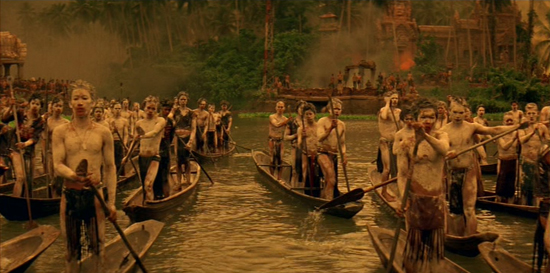
“‘ Never get out of the boat.’ Absolutely goddamn right! Unless you were goin’ all the way… Kurtz got off the boat. He split from the whole f***ing program.”
You have to give a lot of credit to Francis Ford Coppola and John Milius for adapting the un-adaptable into a film. The result has become one of the most beloved war movies ever made. It wasn’t an easy task either. The experience for both men often resembled the novel’s journey itself. The film’s many production woes nearly caused it to be shut down, and Coppola was famously pulled off the set at one time by Paramount execs who were worried that he had lost control of the production. Coppola and Milius’ own philosophical differences also led to story conflicts during the film’s development about which direction that the film should take, Coppola being more of a left-wing pacifist, and Milius more of a right-wing militarist (sound familiar?). This would ultimately lead to a six year production cycle, three of which were spent just editing the film itself (which was constructed from a staggering million feet of film). But, despite all this, Apocalypse Now exists and it is a masterpiece of film-making. And amazingly, Conrad’s Heart of Darkness is still recognizably ingrained in the entire movie. Apocalypse Now is a perfect example of taking a novel, changing it original setting, and actually improving upon it’s overall theme. Heart of Darkness truly was ahead of it’s time with it’s morally ambiguous characters and deep philosophical introspection. It just makes more sense having those themes explored in the insane and surreal experience of the Vietnam War. The movie is easily recommended, but I would also say that you should read the book too, despite the obviously outdated racial stereotypes. Comparing the two is an interesting look into how different examinations on the same themes can work, and how finding the “Heart of Darkness” may be scarily closer and more common than one might think.
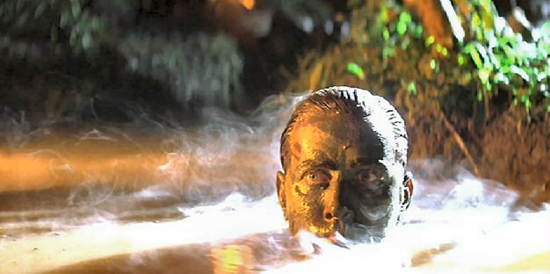
“The Horror. The Horror.”